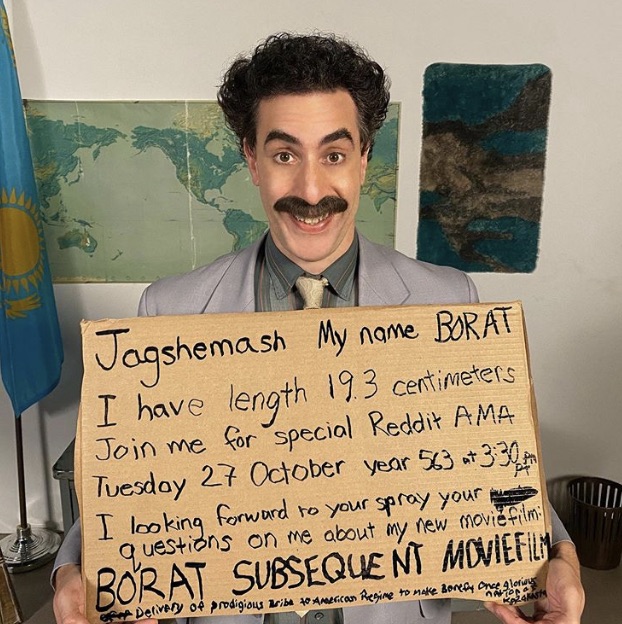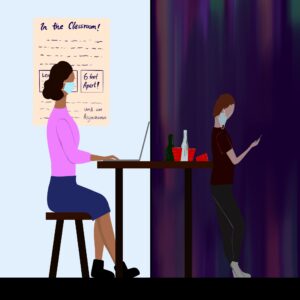Borat Subsequent Moviefilm: Delivery of Prodigious Bribe to American Regime for Make Benefit Once Glorious Nation of Kazakhstan brings to light the absurdity of the reality of America and calls people to action to change the country. The film was released on October 23, sparking further dialogue around 2020’s election-year politics, revisiting the effects of the first film on Kazakhstanis and their government and demonstrating the viability of online streaming services.
Borat Margaret Sagdiyev is a television journalist from Kazakhstan, known for his violation of societal norms, distinct accent and outlandish mannerisms.
Borat is a satirical character constructed and originally appearing in the 2006 box-office hit Borat: Cultural Learnings of America for Make Benefit Glorious Nation of Kazakhstan, commonly referred to as “Borat.” Borat is played by the British comedian and producer Sacha Baron Cohen.
Cohen presents his comedy through the lens of a documentary — interviewing unexpected interviewees ranging from normal citizens to the political elite and sweet-talking them into acting or saying outrageous things.
For instance, in his Showtime comedy series Who Is America, Cohen plays Col. Erran Morrad, an Israeli counterterrorism expert, to mock American gun culture and convince (rather easily) gun rights activists and politicians to cosign Kinder Guardians, a fictitious program whose goal is to arm children as a direct response to the serious school shooting epidemic in America.
Cohen’s characters and comedy, especially Borat, are extremely vulgar, anti-Semitic, racist and sexist. However, this is not meant to amplify or endorse bigotry but rather to amplify and highlight society’s problems.
Cohen’s characters’ bigotry was seen as an attack on President Trump and his supporters. President Donald Trump called Cohen “phony.” Cohen later wrote on Twitter that the president was a “racist buffoon,” as well as jokingly offering him a job after President-Elect Joe Biden is inaugurated.
The president’s remarks came in response to the mockery of Americans, specifically Trump supporters and political aides in Cohen’s new movie, Borat 2.
Borat 2 points out the nature of Trump supporters, among other moments, when Cohen gets them to sing, “Chop ‘em up like the Saudis do” in reference to Democratic politicians. This chant alludes to the gruesome murder of Jamal Khashoggi by the Saudi government. Khashoggi was a Saudi-American journalist critical of the Saudi regime, who, in 2018, was enticed into and then killed at the Saudi Embassy in Istanbul.
Cohen uses satire to point out Trump supporters’ misguidance, by coaxing them into answering questions like “What is more dangerous, the virus or Democrats?”
In addition, Cohen exposes lawyer Rudy Guiliani, who begins to make intimate advances on a young female journalist, Borat’s daughter, Tutar — and insults Vice President Mike Pence at the Conservative Political Action Conference (CPAC) while Pence is speaking on stage (CPAC later attempted to sue Cohen).
The first Borat film was a smash hit, grossing $262 million worldwide and creating numerous popular culture references derived from Borat’s guise, accent and signature saying “Wawaweewa, very nice!” The reaction to Borat was largely positive, despite some jokes blurring or even crossing the line of what is typically considered okay in comedy.
Kazakhstan’s government’s reaction was in stark contrast to how well-received the first film was worldwide. Kazakhstan censored the film, as the jokes often misrepresented Kazakhstan as extremely poor. In theatres, Borat presented a vastly different Kazakhstan than the country in real life, whitewashing the people and having them speak Hebrew rather than Kazah or even Russian, exploiting a false version of their identity.
Many Kazakhstani people resent Borat and rightfully so, as they have had to endure stereotyping, bullying, harassment and even physical harm as a consequence of this movie.
Cohen finally concretely acknowledged his shortcomings; 14 years after the first Borat release he said, “I chose Kazakhstan because it was a place that almost nobody in the U.S. knew anything about, which allowed us to create a wild, comedic, fake world.” Be that as it may, that is exactly where the problem arises; not a lot of people in the United States or in the world knew much about Kazakhstan.
Presenting Borat as this socially awkward, anti-Semitic, racist and sexist figure doesn’t just create a “fake world,” but rather presents real stereotypes that Americans will apply to Kazakhstanis.
Andrei Lynch, a junior at Archbishop Riordan High School, was born in Kokshetau, Kazakhstan and at the age of three was adopted and emigrated to the United States. Having traveled back to the country, he has strong memories of Kazakhstan. Lynch emphasizes that Cohen poorly portrayed his native country. Lynch comments on how Tutar Borat’s daughter is shown in Borat 2: “It was not like that at all…woman who did not seem lesser.”
Lynch, however, notes a silver lining due to the depiction of Kazakhstan; “Many people adopted kids from Kazakhstan because they watched Borat.”
Due to the popularity of Borat, not only were there a lot more people adopting kids like Lynch, but there was more tourism in Kazakhstan. Having said that, the benefits of the movie towards Kazakhstan do not invalidate the struggles Kazakhstanis experienced as a direct consequence of Cohen’s comedy.
Cohen has tried to correct his depiction of the country and says, “The real Kazakhstan is a beautiful country with a modern, proud society — the opposite of Borat’s version.” Despite these words of praise and apology to the country, Cohen still inaccurately pokes fun at Kazakhstan in the second film, leading the Kazah Association to petition to have Borat 2 banned from the Academy Awards.
Unlike many sequel films, Borat 2 does not suffer from the infamous sequel syndrome. Taking notice of the success of the sequel was Kazakhstan’s tourism department. In contrast to the government’s reaction to the first film, Kazakhstan endorsed Borat 2 using Borat’s infamous saying “Very nice!” as a tagline for advertising.
Due to the coronavirus pandemic, Borat 2 did not have a proper theatrical release. Instead, Amazon Studios bought the rights to this movie. Amazon hoped to use Borat’s popularity to incentivize Amazon Prime membership, which was required to watch the movie. The plan to get people on Amazon Prime seemed to work, as 1.6 million households in the US watched Borat 2 on its opening weekend, according to the viewer tracking technologies of Samba TV.
What is also remarkable about Borat 2 is that it was filmed and produced mostly during the pandemic, something many studios have yet to accomplish effectively.
Cohen’s satire in Borat 2 draws attention to the problems the United States faces. The satirical attack was released in a timely fashion, just under two weeks before the election and calls for people to vote and to take part in our democracy.







